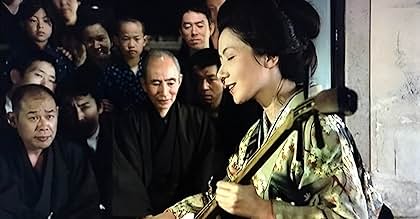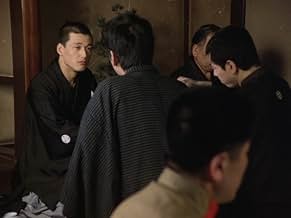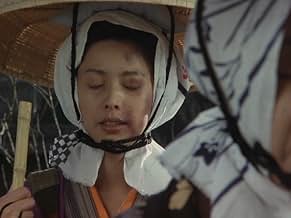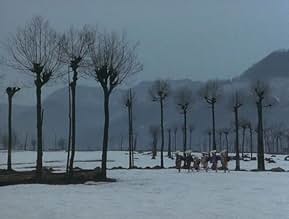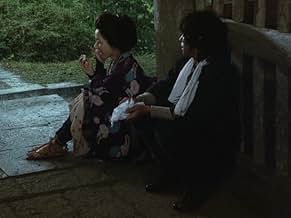A blind traveling musician is abused and oppressed while she tours the country, even though the modern world imposes changes on people's behavior.A blind traveling musician is abused and oppressed while she tours the country, even though the modern world imposes changes on people's behavior.A blind traveling musician is abused and oppressed while she tours the country, even though the modern world imposes changes on people's behavior.
- Director
- Writers
- Stars
- Awards
- 8 wins & 5 nominations total
- Director
- Writers
- All cast & crew
- Production, box office & more at IMDbPro
Featured reviews
I've always been fascinated by folk songs, especially their grim depressing nature. While they're usually about the everyday miseries of common people, there's always an underlying poetic reflection on the societal issues of the times in those simple words. Ballad of Orin is very much like that.
Like a song with a beautiful melody, this film also lulls you in, but it does so with its aesthetics. The cinematography is devoid of anything fancy, instead it has a gorgeous rustic yet delicate quality (one of the most beautiful looking films I've seen). It starts off with an enchanting "float-in-the-wind" serenity, but as the story progresses the winds start to get stronger and stronger and the ballad becomes bleaker and bleaker. Though the time jumps that portray Orin's life were a bit jarrin, I deeply felt and feared for her, which created a wonderful sense of empathy and tension throughout her journey.
I'd highly recommend seeking out Ballad of Orin. It's a beautiful film. You don't really need any preexisting knowledge of Japanese folklore or history, everything's very well explained.
Like a song with a beautiful melody, this film also lulls you in, but it does so with its aesthetics. The cinematography is devoid of anything fancy, instead it has a gorgeous rustic yet delicate quality (one of the most beautiful looking films I've seen). It starts off with an enchanting "float-in-the-wind" serenity, but as the story progresses the winds start to get stronger and stronger and the ballad becomes bleaker and bleaker. Though the time jumps that portray Orin's life were a bit jarrin, I deeply felt and feared for her, which created a wonderful sense of empathy and tension throughout her journey.
I'd highly recommend seeking out Ballad of Orin. It's a beautiful film. You don't really need any preexisting knowledge of Japanese folklore or history, everything's very well explained.
At the center of this moving film is a moving story of unrequited love. It's never clear why Taro remains aloof to Orin's overtures, but the meaning is clear, as it is in many other films by this director, that people want to both give and receive love. Orin, an itinerant musician, blind from birth gives generously of herself both because she has to in order to survive - but also because she longs for human touch. Raised among other women like herself, she knows little of human affection, but longs for it. Taro, hardened by circumstance is tragically alienated from longing, a theme which this director would revisit repeatedly in his other films. The cinematography here is exquisite as is the acting. Shima Iwashita, as Orin performs this role with deep conviction with her voice conveying maximum meaning and effect. Yoshio Harada as the silent brooding Taro is also quite excellent. That said, the film is somewhat linear, with little in the way of subplots and only some flashbacks to break up the narrative, but it is deeply imbued with circumstance and human sensitivity that it bears repeat viewing. It can be difficult to find, but is avaiable on the Internet Archive in it's entirety. A triumph of Japanese cinema, it won he nation's highest award in 1978.
10phawalsh
This is in my top 10 list of films. This is a beautiful, moving film. It is also probably one of the most tragic films I have seen. It got an inexplicably tepid review from Vincent Canby when it premiered in NYC back in 1977 or 1978, which perhaps explains why it was never widely distributed in the US. The film takes place during the first decades of the 20th century, following the story of Orin, blind from birth, from childhood on. The film is told largely from her perspective, from a woman's perspective, which is rare in film, especially Japanese films. The other reviewer is mistaken - she does not take her own life, but he is entirely correct that the film deserves a much, much wider audience than it has received, at least in this country.
More than 20 years after seeing this movie, and having searched for it for almost as long, I finally obtained a decent DVD with English subtitles from play-asia.com (Hong Kong). It is listed there as Hanare Goze Orin. It's rather expensive, but worth it, in my opinion. You'll need a region-free player.
More than 20 years after seeing this movie, and having searched for it for almost as long, I finally obtained a decent DVD with English subtitles from play-asia.com (Hong Kong). It is listed there as Hanare Goze Orin. It's rather expensive, but worth it, in my opinion. You'll need a region-free player.
The story was well told and the cinematography was well done. Still, the story was basically one of molestation from beginning to end. It literally went from bad to worse to FML!!!
This is that movie you only see once. I don't even know why anyone would tell this story. It's so bloody sad but in such a subtle way as to make it unbearable. You keep hoping something good will happen and stick.
Anyway... see it once but make sure before you start the film you pack all the sharp objects in your house and give them to your neighbor for the night because you WILL want to use one.
This is that movie you only see once. I don't even know why anyone would tell this story. It's so bloody sad but in such a subtle way as to make it unbearable. You keep hoping something good will happen and stick.
Anyway... see it once but make sure before you start the film you pack all the sharp objects in your house and give them to your neighbor for the night because you WILL want to use one.
My 5th Shinoda (after Pale Flower, Under the Blossoming Cherry Tree, Double Suicide, and Himiko)
A greatly affecting first hour was sullied by a disappointing turn of theme and plot, to where the film became less interested in vindicating it's sympathetic, central character, as it shifted its focus towards a more macro and less compelling cause. Despite being disappointed in how the events of the film were resolved, a litany of beautiful moments still linger in my mind, and I consider Ballad of Orin to be a worthwhile experience overall.
A greatly affecting first hour was sullied by a disappointing turn of theme and plot, to where the film became less interested in vindicating it's sympathetic, central character, as it shifted its focus towards a more macro and less compelling cause. Despite being disappointed in how the events of the film were resolved, a litany of beautiful moments still linger in my mind, and I consider Ballad of Orin to be a worthwhile experience overall.
Did you know
- TriviaFilm apparently debuted in foreign theaters on January 21, 1977. Awards: Best Actress-Shima Iwashita (Kinema Jumpo): Best Actress-Shima Iwashita, Best Cinematography (Mainichi Film Concoures): Best Actress-Shima Iwashita, Best Cinematography (Japanese Academy Awards).
- ConnectionsReferences L'Intendant Sansho (1954)
Details
Contribute to this page
Suggest an edit or add missing content


